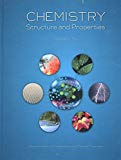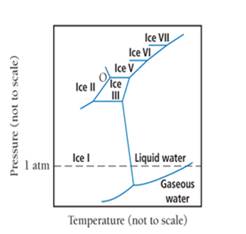
Chemistry: Structure and Properties Custom Edition for Rutgers University General Chemistry
15th Edition
ISBN: 9781269935678
Author: Nivaldo J. Tro
Publisher: Pearson Education
expand_more
expand_more
format_list_bulleted
Concept explainers
Textbook Question
Chapter 12, Problem 76E
The high-pressure phase diagram of ice is shown here. Notice that, under high pressure, ice can exist in several different solid forms. Which three forms of ice are present at the triple point marked O? What is the density of ice ll compared to ice I (the familiar form of ice)? Would ice lll sink or float in liquid water?

Expert Solution & Answer
Want to see the full answer?
Check out a sample textbook solution
Students have asked these similar questions
Please provide the retrosynthetic analysis and forward synthesis of the molecule on the left from the starting material on the right. Please include hand-drawn structures! will upvote!
Please correct answer and don't used hand raiting
Please provide the retrosynthetic analysis and forward synthesis of the molecule on the left from the starting material on the right. Please include hand-drawn structures! will upvote!
(please correct answer and don't used hand raiting)
Please provide the retrosynthetic analysis and forward synthesis of the molecule on the left from the starting material on the right. Please include hand-drawn structures! will upvote!
Chapter 12 Solutions
Chemistry: Structure and Properties Custom Edition for Rutgers University General Chemistry
Ch. 12 - Prob. 1SAQCh. 12 - Liquid nitrogen boils at 77 K. This image depicts...Ch. 12 - Taking intermolecular forces into account, which...Ch. 12 - What substance experiences dipole-dipole forces?...Ch. 12 - Prob. 5SAQCh. 12 - Prob. 6SAQCh. 12 - Determine the amount of heat (in kJ) required to...Ch. 12 - Prob. 8SAQCh. 12 - Prob. 9SAQCh. 12 - Prob. 10SAQ
Ch. 12 - Prob. 11SAQCh. 12 - Why do ethanol and dimethyl ether have such...Ch. 12 - Why are intermolecular forces important?Ch. 12 - Prob. 3ECh. 12 - Prob. 4ECh. 12 - Prob. 5ECh. 12 - Which factors cause transitions between the solid...Ch. 12 - Describe the relationship between the state of a...Ch. 12 - Prob. 8ECh. 12 - Prob. 9ECh. 12 - Prob. 10ECh. 12 - Prob. 11ECh. 12 - Prob. 12ECh. 12 - Prob. 13ECh. 12 - What is the ion-dipole force? Why is it important?Ch. 12 - Prob. 15ECh. 12 - Prob. 16ECh. 12 - What is capillary action? How does it depend on...Ch. 12 - Explain what happens during the processes of...Ch. 12 - Why is vaporization endothermic? Why is...Ch. 12 - Prob. 20ECh. 12 - What is the heat of vaporization for a liquid, and...Ch. 12 - Explain the process of dynamic equilibrium. How is...Ch. 12 - What happens to a system in dynamic equilibrium...Ch. 12 - Prob. 24ECh. 12 - Prob. 25ECh. 12 - Prob. 26ECh. 12 - Prob. 27ECh. 12 - Prob. 28ECh. 12 - Prob. 29ECh. 12 - Prob. 30ECh. 12 - Prob. 31ECh. 12 - Examine the heating curve for water in section...Ch. 12 - What is a phase diagram? What is the significance...Ch. 12 - Draw a generic phase diagram and label its...Ch. 12 - Prob. 35ECh. 12 - Determine the kinds of intermolecular forces that...Ch. 12 - Determine the kinds of intermolecular forces that...Ch. 12 - Prob. 38ECh. 12 - Arrange these compounds in order of increasing...Ch. 12 - Prob. 40ECh. 12 - Pick the compound with the highest boiling point...Ch. 12 - Pick the compound with the highest boiling point...Ch. 12 - Prob. 43ECh. 12 - Prob. 44ECh. 12 - Prob. 45ECh. 12 - Prob. 46ECh. 12 - Prob. 47ECh. 12 - Water (a) “wets” some surfaces and beads up on...Ch. 12 - The structures of two isomers of heptanes are...Ch. 12 - Prob. 50ECh. 12 - Water in a glass tube that contains grease or oil...Ch. 12 - When a thin glass tube is put into water, the...Ch. 12 - Which evaporates more quickly: 55 mL of water in a...Ch. 12 - Prob. 54ECh. 12 - Spilling room temperature water over your skin on...Ch. 12 - Prob. 56ECh. 12 - The human body obtains 915 kJ of energy from a...Ch. 12 - Prob. 58ECh. 12 - Suppose that 0.95 g of water condenses on a 75.0 g...Ch. 12 - Prob. 60ECh. 12 - Prob. 61ECh. 12 - Prob. 62ECh. 12 - Prob. 63ECh. 12 - Prob. 64ECh. 12 - How much energy is released when 65.8 g of water...Ch. 12 - Prob. 66ECh. 12 - An 8.5 g ice cube is placed into 255 g of water....Ch. 12 - Prob. 68ECh. 12 - Prob. 69ECh. 12 - Prob. 70ECh. 12 - Prob. 71ECh. 12 - Prob. 72ECh. 12 - Prob. 73ECh. 12 - Prob. 74ECh. 12 - Prob. 75ECh. 12 - The high-pressure phase diagram of ice is shown...Ch. 12 - Prob. 77ECh. 12 - Prob. 78ECh. 12 - Prob. 79ECh. 12 - How is the density of solid water compared to that...Ch. 12 - Prob. 81ECh. 12 - Prob. 82ECh. 12 - Prob. 83ECh. 12 - Prob. 84ECh. 12 - Four ice cubes at exactly 00C with a total mass of...Ch. 12 - Prob. 86ECh. 12 - Draw a heating curve (such as the one in Figure...Ch. 12 - Draw a heating curve (such as the one in Figure...Ch. 12 - Prob. 89ECh. 12 - A sealed flask contains 0.55 g of water at 280C....Ch. 12 - Prob. 91ECh. 12 - Prob. 92ECh. 12 - Prob. 93ECh. 12 - Given that the heat of fusion of water is —6.02...Ch. 12 - The heat of combustion of CH4 is 890.4 kJ/mol, and...Ch. 12 - Prob. 96ECh. 12 - Prob. 97E
Knowledge Booster
Learn more about
Need a deep-dive on the concept behind this application? Look no further. Learn more about this topic, chemistry and related others by exploring similar questions and additional content below.Similar questions
- CaTiO3 has a perovskite structure. Calculate the packing factor.Data: ionic radii Co+2 = 0.106 nm, Ti+4 = 0.064 nm, O-2 = 0.132 nm; lattice constant is a = 2(rTi4+ + rO-2).(a) 0.581(b) -0.581(c) 0.254(d) -0.254arrow_forwardIn the initial linear section of the stress-strain curve of a metal or alloy. Explain from the point of view of atomic structure?(a) No, the atomic level properties of the material can never be related to the linear section.(b) The elastic zone is influenced by the strength of the bonds between atoms.(c) The stronger the bond, the less rigid and the lower the Young's Modulus of the material tested.(d) The stronger the bond, the less stress is necessary to apply to the material to deform it elastically.arrow_forwardThe degree of polymerization of polytetrafluoroethylene (Teflon) is 7500 (mers/mol). If all polymer chains have equal length, state the molecular weight of the polymer and the total number of chains in 1000 g of the polymer(a) 50 000 g/mol; 0.03·1020 chains(b) 100 000 g/mol; 1.03·1020 chains(c) 750 000 g/mol; 8.03·1020 chainsarrow_forward
- In natural rubber or polyisoprene, the trans isomer leads to a higher degree of crystallinity and density than the cis isomer of the same polymer, because(a) it is more symmetrical and regular.(b) it is less symmetrical.(c) it is irregular.arrow_forwardMost ceramic materials have low thermal conductivities because:(a) Electron mobility is strongly restricted due to their strong ionic-covalent bonding.(b) False, in general they are excellent thermal conductors (they are used in ovens).(c) Electron mobility is dependent on T and therefore they are poor conductors at high temperatures.(d) Electron mobility is very restricted by secondary bonds.arrow_forwardResistivity and electrical conductivity.(a) In metals, resistivity decreases.(b) In metals, resistivity decreases and conductivity in semiconductors also decreases with increasing temperature.(c) With increasing temperature, resistivity in metals and conductivity in semiconductors also increases.(d) None of the above.arrow_forward
- State the difference between concrete and Portland cement.(a) There are no differences, in concrete the chemical composition is silicates and in cement aluminates.(b) The chemical composition of concrete is based on silicates and in cement aluminates.(c) Concrete is composed of aggregates bound by cement and cement "only" contains different minerals.(d) Cement is aggregates bound by concrete.arrow_forwardAmorphous polymers are usually transparent and semi-crystalline polymers are usually opaque. Correct?(a) No. They are all made up of polymer chains. True if they were monomers.(b) Yes. The arrangement of the chains determines the passage of light.(c) No. It is the other way around.(d) Crystallinity or amorphousness does not affect the transparency or opacity of the material.arrow_forwardThe name ferrites refers to a family of(a) ceramic materials that exhibit ferrimagnetic behavior due to their ionic composition.(b) polymeric materials that exhibit ferrimagnetic behavior due to their ionic composition.(c) concrete-based materials that exhibit ferrimagnetic behavior due to their ionic composition.(d) superconducting materials that exhibit ferrimagnetic behavior due to their ionic composition.arrow_forward
- State the two main factors affecting ion packing in the solid state.(a) Number of covalent bonds and their unsaturation.(b) Mechanical properties and degradation temperature.(c) Number of crystalline phases present and grain size.(d) Electroneutrality and ion size.arrow_forwardThe ceramic materials alumina (Al2O3) and chromium oxide (Cr2O3) form an isomorphic phase diagram. The solubility will be(a) unlimited of one ceramic in the other.(b) very limited depending on the weight % of Al2O3(c) very limited depending on the weight % of Cr2O3(d) partial of one ceramic in the other.arrow_forwardAmong the main characteristics of optical fibers, indicate which of the following is not included:(a) Opacity and Rigidity(b) Flexibility(c) Transparency(d) Low thicknessarrow_forward
arrow_back_ios
SEE MORE QUESTIONS
arrow_forward_ios
Recommended textbooks for you
 ChemistryChemistryISBN:9781305957404Author:Steven S. Zumdahl, Susan A. Zumdahl, Donald J. DeCostePublisher:Cengage Learning
ChemistryChemistryISBN:9781305957404Author:Steven S. Zumdahl, Susan A. Zumdahl, Donald J. DeCostePublisher:Cengage Learning World of Chemistry, 3rd editionChemistryISBN:9781133109655Author:Steven S. Zumdahl, Susan L. Zumdahl, Donald J. DeCostePublisher:Brooks / Cole / Cengage Learning
World of Chemistry, 3rd editionChemistryISBN:9781133109655Author:Steven S. Zumdahl, Susan L. Zumdahl, Donald J. DeCostePublisher:Brooks / Cole / Cengage Learning Chemistry by OpenStax (2015-05-04)ChemistryISBN:9781938168390Author:Klaus Theopold, Richard H Langley, Paul Flowers, William R. Robinson, Mark BlaserPublisher:OpenStax
Chemistry by OpenStax (2015-05-04)ChemistryISBN:9781938168390Author:Klaus Theopold, Richard H Langley, Paul Flowers, William R. Robinson, Mark BlaserPublisher:OpenStax Chemistry: The Molecular ScienceChemistryISBN:9781285199047Author:John W. Moore, Conrad L. StanitskiPublisher:Cengage Learning
Chemistry: The Molecular ScienceChemistryISBN:9781285199047Author:John W. Moore, Conrad L. StanitskiPublisher:Cengage Learning Introductory Chemistry: An Active Learning Approa...ChemistryISBN:9781305079250Author:Mark S. Cracolice, Ed PetersPublisher:Cengage Learning
Introductory Chemistry: An Active Learning Approa...ChemistryISBN:9781305079250Author:Mark S. Cracolice, Ed PetersPublisher:Cengage Learning Principles of Modern ChemistryChemistryISBN:9781305079113Author:David W. Oxtoby, H. Pat Gillis, Laurie J. ButlerPublisher:Cengage Learning
Principles of Modern ChemistryChemistryISBN:9781305079113Author:David W. Oxtoby, H. Pat Gillis, Laurie J. ButlerPublisher:Cengage Learning

Chemistry
Chemistry
ISBN:9781305957404
Author:Steven S. Zumdahl, Susan A. Zumdahl, Donald J. DeCoste
Publisher:Cengage Learning

World of Chemistry, 3rd edition
Chemistry
ISBN:9781133109655
Author:Steven S. Zumdahl, Susan L. Zumdahl, Donald J. DeCoste
Publisher:Brooks / Cole / Cengage Learning

Chemistry by OpenStax (2015-05-04)
Chemistry
ISBN:9781938168390
Author:Klaus Theopold, Richard H Langley, Paul Flowers, William R. Robinson, Mark Blaser
Publisher:OpenStax

Chemistry: The Molecular Science
Chemistry
ISBN:9781285199047
Author:John W. Moore, Conrad L. Stanitski
Publisher:Cengage Learning

Introductory Chemistry: An Active Learning Approa...
Chemistry
ISBN:9781305079250
Author:Mark S. Cracolice, Ed Peters
Publisher:Cengage Learning

Principles of Modern Chemistry
Chemistry
ISBN:9781305079113
Author:David W. Oxtoby, H. Pat Gillis, Laurie J. Butler
Publisher:Cengage Learning
Types of Matter: Elements, Compounds and Mixtures; Author: Professor Dave Explains;https://www.youtube.com/watch?v=dggHWvFJ8Xs;License: Standard YouTube License, CC-BY